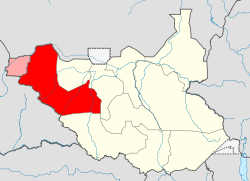WBEG: Balanda community seeks amnesty for protest ringleaders
February 3, 2013 (JUBA) – Community leaders and youth groups from South Sudan’s border state Western Bahr el Ghazal (WBEG) have called on the state and central government to pardon those alleged to have incited or participated in a spate of unrest last year which left a number of people dead, state adviser on peace and reconciliation Effesio Kon Uguak said on Sunday.
 Uguak, whose office organised an aggressive campaign for reconciliation dialogue and peace building following the violent outbreak, said participants at the conference expressed a strong desire for those accused of participating or instigating the December 2012 protests to be granted amnesty.
Uguak, whose office organised an aggressive campaign for reconciliation dialogue and peace building following the violent outbreak, said participants at the conference expressed a strong desire for those accused of participating or instigating the December 2012 protests to be granted amnesty.
Twenty-six migrant workers from the Dinka ethnic group were killed in the midst of last year’s protests in the state’s capital Wau, after the government’s decision to move the state’s capital from Wau to Baggari, which many members of the Balanda ethnic group initially perceived as an attempt to marginalise their community.
The decision stirred simmering tensions between the Balanda and Dinka groups, leading to a retaliatory cycle of death and violence in both communities, forcing more than 5,000 women and children to seek refuge inside the United Nations’ peacekeepers compound.
Uguak said the violent outbreak had caught the normally peaceful state by surprise, with both WBEG leaders and local citizens now determined to pursue peaceful dialogue in order to mend ties and restore hope and confidence.
“People have expressed strong feelings and desires. They are appealing for [an] amnesty to be granted to those who may have been involved directly or indirectly. I mean those suspected to have instigated the violence and those who may have participated. They want the amnesty to be part of dialogue and reconciliation,” Uguak explains.
Reconciliation talks were officially launched on Friday 1 February, the event bringing together community leaders and institutions from across the state, with representatives from Warrap and Lakes state also attending.
“We intend to extend similar programs and activities to our Bomas (sub districts) and villages, so that our people are fully educated to accept living in peace like before,” Uguak told Sudan Tribune on Sunday.
State minister for information Derek Alfred Uya said in December that eight people, including traditional leaders, were arrested after being accused of failing to alert authorities about the incident in which 26 civilians lost their lives.
The victims were killed in Farajallah locality, some 77km south-west of the state capital Wau. The motive for the killings remains unclear, however, the state government said it was holding suspects to establish the facts.
State governor Rizik Zachariah Hassan said in January that his administration had found evidence that the violence was “politically instigated by people with special interest”, to create chaos and instability in the region.
Speaking to Sudan Tribune in December, state security adviser Dominic Rizik Samuel said the arrests were made because the state administration believed most of the suspects had prior knowledge about the circumstances surrounding the events and had failed to act to prevent the deaths.
“They had prior information which they did not share with us so that we could intervene before the incident occurred. They will be taken to court to face charges of complicity and abetting crime,” he said.
“We are pursuing other ring-leaders, whose names we have, and who will assist us to arrest all those who participated in the killings and those who participated in blocking roads and the protest.”
Demonstrations on 8, 9 and 18 December in Wau against the relocation of the county’s headquarters turned violent after police intervened, killed an estimated nine people after soldiers from the South Sudanese army (SPLA) allegedly opened fire on civilians protesting against the re-location of the Wau county headquarters.
Al Jazeera English | Protestors shot at by South Sudan army | 13 December 2012
Hundreds of armed Dinka youth allegedly retaliated in response, attacking the town, shooting at police and burning buildings.
The official death toll from the protests remains unclear, with the UN reporting that nine people had died in the first clashes on 8 and 9 December, while former Wau county commissioner John Peter Miskin claimed the figure was as high as 25.
(ST)
